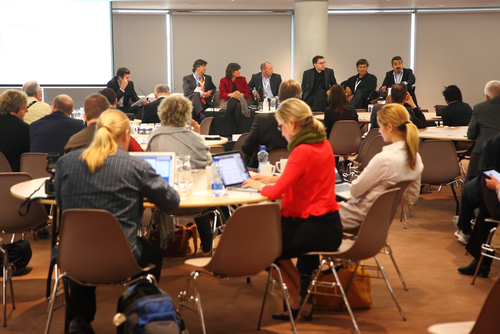PEN eNews 2(4) December 2012
PEN
® eNews is a monthly e-newsletter shared with the global PEN Community and created to help dietitians position themselves as leaders in evidence-based nutrition practice. In addition, users of the PEN System will find articles on the new evidence, resources and features available and how to maximize one's use of PEN.

A group of dietitians in a room = magic
 What happens when you assemble a group of dietitians together in a room at a conference? You experience discussion, respectful debate and insatiable curiosity. I recently co-presented at a conference discussing professional uses of social media, and how dietitians can enhance their role as the trusted source of nutrition information through social media. While many dietitians reported embracing social media for personal use and openness to what it can do for the dietetics profession, there was some hesitation expressed. Notably, that while social media has its merits, we need to remember the value of face-to-face communications and personal contact – and that these continue to be essential and valuable skills for our profession.
What happens when you assemble a group of dietitians together in a room at a conference? You experience discussion, respectful debate and insatiable curiosity. I recently co-presented at a conference discussing professional uses of social media, and how dietitians can enhance their role as the trusted source of nutrition information through social media. While many dietitians reported embracing social media for personal use and openness to what it can do for the dietetics profession, there was some hesitation expressed. Notably, that while social media has its merits, we need to remember the value of face-to-face communications and personal contact – and that these continue to be essential and valuable skills for our profession.
We couldn’t agree more. We see the vast skills that dietitians have – in written communications, be it peer-reviewed journal articles, PEN practice question authors and reviewers, newspaper or newsletter articles, and the emerging communications style required for social media – as well as in oral communication, whether it is in presentations, workshops or in client counseling. While we are most thankful for electronic communications that help to connect our global profession, we are also thankful for the opportunity to come together in-person.
This coming together in-person is what PEN eNews 2(4) celebrates – the spirit and energy that was created when thousands of dietitians came together at the International Congress of Dietetics this past September 2012. You can read about one presenter’s reflections on how her local research made international connections in Sharing Results of the DAILY Project at ICD 2012, you can witness knowledge transfer in action with the article Evidence-based Practice – from Definition to Implementation, and how dietitians made use of electronic technology at ICD2012 in Dietitians LEAP into Cyberspace at ICD2012: Report from the Dietitians Association of Australia. We also have Social Media Tip #4. This, and more in PEN eNews 2(4).
At this time, I also wanted to share that Sylvia Turner, the British Dietetic Association's PEN Project Development Office/KTP Associate, is leaving the BDA. I really appreciated working working with Sylvia. She was always a deep thinker and always kept in mind the best interests of the Global PEN Users. On behalf of everyone on the PEN Global Team, we would like to wish Sylvia the best of luck in her future endeavours.
Kristyn Hall MSc, RD
Editor, PEN eNews
PEN eNews may contain links to other external websites.
Pennutrition.com is not responsible for the privacy practices or the content of such external websites. Dietitians of Canada, Dietitians Association of Australia, Dietitians New Zealand and the British Dietetic Association do not endorse the content, products or services on other websites.
What's New in PEN
Here is a list of our updated content in PEN, including updated knowledge pathways, new practice questions, updated practice questions, professional tools, and new handouts available.
New Knowledge Pathways 
Updated Knowledge Pathways 
New Practice Questions 
Updated Practice Questions 
Professional Tools
Client Tools
How do I…become more involved with the PEN community?
Written by Lisa Koo, BSc, RD PEN Quality 
Did you know that in addition to
Facebook and
Twitter that PEN is also a group on LinkedIn? The
PEN LinkedIn group is a forum where users can interact with other professionals and the PEN team about topics related to evidence-based dietetic practice and nutrition.
Discussions on our LinkedIn group have included:
- What is the biggest frustration that you experience as a dietitian?

- Arsenic and rice consumption.
- Junk food warning labels and taxes.
- Whether egg yolks are almost as bad as smoking with respect to cardiovascular disease.
- The link between antibiotic use and pediatric obesity.
- The increasing trend of dietitians in supermarkets.
Joining the
PEN LinkedIn group is a great way to connect with other professionals who are interested in an evidence-based approach and discuss current topics related to this.
See what your colleagues have to say and join in on the discussion. Also, if you have any questions about evidence-based dietetic practice, this is a good venue for you to post your question. You can also start a discussion. The PEN LinkedIn group is monitored by PEN administrators.
Want to be a part of the conversation? Visit our PEN LinkedIn group and join in a discussion! We hope to see you soon!
Meet Your Global Partners: UK 
PEN is an international collaboration - we work internationally on a daily basis developing PEN content. The benefit of working so closely is that we can respond to the needs of our users and reflect practice from each of the collaborating countries. While we are all nutrition and dietetic professionals, the practice in each of our countries can vary greatly. PEN provides the foundation of dietetic practice, but its application might be different, depending on the political and structural differences of health care delivery in our countries. Here we detail the practice, policy and politics of nutrition and dietetics in the UK and how the application of the evidence in PEN responds to this.
The United Kingdom is made up of four countries: England, Scotland, Northern Ireland and Wales. While the UK Parliament (the highest legislative authority in the UK) is based in London; Scotland, Northern Ireland and Wales each have a devolved Parliament. In short, a number of powers have been passed from the central government to each of the devolved institutions. Although these powers vary across the four countries they all have devolved powers (can create, amend or repeal legislation) regarding healthcare and each of them has their own systems of delivering National Health Services (NHS) services. PEN aims to reflect each of these healthcare systems and when reviewing or writing PEN content, policy and guidelines from each country is consulted.
The UK NHS began in 1948 it provided, for the first time, medical care free at the point of delivery. Most of the 7,800 dietitians in the UK are employed in the NHS. NHS dietitians can work in primary or secondary healthcare in a number of different settings including hospitals and GP practices (General Practitioners/Family Doctors employed by the NHS). Many other dietitians in the UK work in research, education, and industry or freelance/private practice. With so many dietitians being employed within the NHS, the potential value in having pooled our collective resources into one knowledge translation platform is massive. It means we can focus our energies on applying PEN into our practice and reduce the additional workload that evidence-based practice can present.
PEN users can be reassured that no matter what is happening on a political level, PEN provides the findings from the latest available research. Over the last two years we have seen examples of policy and guidance being published where PEN content already reflects the recommendations. We know that there is emerging science in so many nutrition and dietetic fields; we also know that our national policy may take some time to catch up. This said, when new evidence emerges that changes practice, PEN’s team of international experts reflect this in a timely and effective manner.
The title of dietitian is regulated and protected in the UK and all dietitians are required to have studied in an approved university degree course and be registered with the UK regulatory body, The Health and Care Professions Council (HCPC). Most dietetic degree courses are a 4 year university programme of study but there are also 3 year intensive programmes and masters programmes. The British Dietetic Association (BDA) aids the development of curriculum standards and communicates them to education and training providers. Work is currently ongoing which aims to advise the higher education institutions about how they can incorporate PEN into the curriculum.
The BDA is the only professional membership organisation for dietitians in the UK and represents around 80% of those registered with the HCPC. In addition to registered dietitians, the BDA also has other membership categories for a number of different careers including dietetic assistants, nutritionists* and other health professionals that have a working interest in nutrition and dietetics.
* “Nutritionist” is not a protected title in the UK, in effect meaning that anyone could call themselves a nutritionist. This said, nutrition degrees (without the clinical dietetic training) are available at UK universities and it is graduates of these degrees that can become members of the BDA. PEN can be accessed by all of the BDA’s members. BDA members can find out more about PEN at:
www.bda.uk.com/pen
Following the passing of the
Health and Social Care Act (2012) the NHS in England is currently facing the biggest restructure in its history; with responsibility for commissioning NHS services being transferred to GP’s [family doctors]. Local Government also takes over responsibility for public health services and overall health and social care needs assessment. This will take effect from April 2013. The purpose of this is to commission services locally to meet local health needs while meeting national health outcomes. However, there are concerns that the changes introduce competition into the delivery of health care and could lead to fragmentation and that there will be a great variety in services provided.
Never before then, has a resource such as PEN been more essential for nutrition and dietetic professionals in the UK. Our members have already reported a reduction in the funding available for them to continue their professional development. Alongside evidence-based practice, continued professional development (CPD) is an essential part of HCPC registration, which has to be proven by way of a CPD portfolio; this can be called on for auditing every two years.
PEN facilitates CPD perfectly allowing dietitians to gain insight into both the established and emerging nutrition and dietetic research. This in turn will help dietitians practice in an evidence-based manner. Over 2200 of our members have signed up for PEN since December 2010, if you haven’t yet joined your international colleagues why not take a look today at:
www.pennutrition.com there’s even a 15 day trial. You have nothing to lose, just a world of international collaborating to gain!
Article written by Sylvia Turner BSc, RD
PEN Project Development Officer/KTP Associate, British Dietetic Association
Dietitians LEAP into cyberspace at ICD2012: Report from the Dietitians Association of Australia
(adapted with permission from DAA September E-newsletter)
After months of preparation from Dietitians Association of Australia (DAA) staff, with support from DAA’s Social Media Advisory Committee (SMAC), we were delighted to see many Australian and international dietitians LEAP into the social media world for the International Congress of Dietetics, held in Sydney, Australia on 5-8 September 2012.
The online interaction on ICD’s social networking sites such as Facebook, Twitter and YouTube was extremely positive. Many online followers who were unable to attend the congress were grateful to those Tweeting and posting content and photos, which allowed them to get amongst the action as it happened!
Here is a snapshot of some of the social media outcomes from ICD2012:Twitter (@icd2012)- The account had more than 600 Twitter followers (mostly dietitians) from across the world
- More than 4,500 Tweets were generated using the #ICD2012 hashtag
- The official ‘Tweet Up’ at the Welcome Reception had a great turn out, attracting around 20 delegates
- Responses to the official ICD2012 Twitter competition, which was supported by numerous congress sponsors and exhibitors, was pleasing – with five prizes given away
- Delegates were able to view ICD2012 Tweets at the congress through a live Twitter stream set-up on numerous televisions throughout the venue.
A selection of the many great Tweets:
- What a great day #ICD2012 – learning about food insecurity, FODMAPs and more...inspiring & stimulating.
- Missed the first 20 mins of the social networking workshop whilst I set up a Twitter account – oh the irony! #ICD2012.
- Sylvia-Escott Stump takes the stand to speak about nutrition genomics! Folate especially can alter gene expression. #ICD2012.
- Networks, knowledge, readiness, confidence, resilience. Just some of the qualities needed to influence – Pauline Mulholland #ICD2012.
- People with IBS have more nerve endings lining the gut, therefore experience heightened sensations such as bloating and pain #ICD2012.
- Almost 500 ‘Likes’ to the ICD Facebook page
- ICD Facebook content reached more than 20 countries
- During the week of the congress, ICD Facebook content reached almost 9,000 people
- During the week of the congress, more than 250 people were talking about ICD on their Facebook pages.
Most popular Facebook posts (be sure to check these out if you haven’t already)
- Video of the Australian Youth Choir at the Opening Ceremony
- Video highlights from the Opening Ceremony.
These clips can also be found on DAA’s YouTube Channel at:
http://www.youtube.com/user/DAAvideos
A big thank you to all dietitians who got involved with the social media channels for ICD2012. Your informative and enthusiastic messages created a great vibe for the Congress.
DAA also noticed many budding social media dietitians engaging in ‘cyberspace’ in the last couple of days of the congress. We hope our social media efforts have inspired dietitians across the world to LEAP into this area and spread the expert word about health and nutrition across the ever-growing domain that is social media!
Will you make the LEAP and get involved in social media?
Connect with DAA:

Website:
www.daa.asn.au Facebook:
www.facebook.com/dietitiansassociation YouTube:
www.youtube.com/DAAvideos Twitter: @HealthyWtWk
Article submitted by DAA’s Communications and Marketing Team.
Submitted by
By: Theo Phillips MSc, RD and Dr Gordon Zello PhD
Sharing Results of the DAILY Project
Diet Approaches to Increase Lentil Consumption in Youth
DAILY researchers* at the University of Saskatchewan asked the question: Why aren’t we eating more lentils? They were recently able to share their findings at the International Congress of Dietetics (ICD) in Sydney, Australia. The opportunity allowed an international lens to be placed on their research and compare global influencers on food choice.
Even though lentil consumption in Canada is low, Canada is one of the top pulse exporters in the world – i.e. – we export, not eat, our lentils. In fact, Saskatchewan grows 99 per cent of Canada's lentil and chickpea crops and 67 per cent of Canada's dry pea crop contributing hundreds of millions of dollars to Canadian economy.
As children are future consumers of lentils, the DAILY project examined, via a questionnaire given to caregivers, perceived and actual benefits/barriers to lentil consumption, nutrition knowledge of pulse foods, current lentil consumption and demographics. A convenience sample (n=401) was obtained from six schools across different geographic locations in Saskatoon.
Results
 Respondents had more positive beliefs (i.e. correctly identified health benefits) than negative beliefs, but do not eat lentils regularly.
Respondents had more positive beliefs (i.e. correctly identified health benefits) than negative beliefs, but do not eat lentils regularly. - Nutrition knowledge was weakly correlated to lentil intake.
- 58% of caregivers never or rarely (less than once per month) ate lentils.
- Researchers identified little to no correlation of lentil intake by demographic or income levels.
- Top barriers: families were unsure how to cook lentils (actual barrier), belief that family would not like them (perceived barrier) and lentils take too long to cook (perceived barrier).
Practice Point: Dietitians’ can be leaders in pulse promotion by focusing less on knowledge campaigns and instead tailoring strategies to address perceived and actual barriers.
Reflecting upon both DAILY and ICD, I think the most valuable part of the conference was the poster presentations. It was validating to see the challenges we [dietitians] have in Canada are felt globally. For example, Australia pulse groups are in the midst of a domestic pulse promotion campaign which opened the doors for collaboration between Canada and Australian pulse interest groups. Layering experiences with international colleagues adds a depth to your knowledge as you try to knit together the global picture of your interest area.
I think RDs should proactively pursue research opportunities (both academic and practice-based), leaders/managers should encourage or facilitate research where possible and we should all advocate for knowledge transfer opportunities such as research sharing presentations at conferences when we meet with our innovative colleagues. When in-person opportunities are not available, we can take advantage of technologies that help to bring together dietitians from around the world.
Written by
Debbie MacLellan RD, PhD and Jayne Thirsk RD, PhD, FDC
Evidence-based Practice – from Definition to Implementation
hosted at the 16th International Congress of Dietetics in Sydney Sept 5-8, 2012
In 2010, the Board of Directors of the ICDA [International Confederation of Dietetic Associations] adopted the definition of Evidence-based practice for dietetics that was developed as part of an international consultation process. This workshop is to assist participants to both understand the process of development and to consider methods of implementation. ICDA is seeking input from the international community on how it can best assist in the process of global uptake. (International Congress of Dietetics 2012 Program)
Approximately 45 participants representing diverse practice settings and a variety of countries took part in the workshop. A short presentation introducing the definition of
evidence-based dietetic practice and the process through which it was created and endorsed provided context and then the participants got down to work to answer the following questions:
- How do you personally see using the ICDA definition of evidence-based dietetic practice?
- What are you currently doing in your workplace to implement evidence-based practice?
- What barriers do you anticipate in using the definition to support evidence-based practice?
- What is the national dietetic association role in advancing evidence-based dietetic practice?
- What role should ICD play in advancing evidence-based dietetic practice?
- What strategies and tools do you need to support advancing evidence-based dietetic practice?
Participants shared their ideas and identified strategies they felt would help with advancing evidence-based practice around the globe. A summary of the dialogue and recommendations will be sent to the Board of Directors of ICDA.
Watch the ICDA website for more details on next steps.
"How my Experience as a Dietetic Intern with PEN has Transformed me from a Confused User to an Advocate for using PEN in Dietetic Practice"
Student corner
Spotlight on Jordan Mak

Jordan Mak
BSc Candidate,
McGill University Dietetic Intern
Although my professors had frequently mentioned that PEN was a tool I could use to find nutritional information, my experience was limited only to the occasional search for a puzzling nutrition question. However, when I was assigned a six-week rotation to help edit and develop PEN content, I discovered that the resources it has to offer extends far beyond just the practice questions.
Little did I know that this global resource is categorized into 168 knowledge pathways addressing everything from population health, to disease-specific nutrition, to the application of specific nutrients. Each pathway provides background information, the practice questions themselves, practice guidance summaries, and even tools and resources for professionals and consumers. All material on PEN is revised and edited by experts in the field to ensure quality and accuracy of the information provided. With all these handy resources, PEN has now become my first go-to for practice needs.
My experience with PEN has also taught me to frequently question whether or not there is evidence to support the practices we preach. It is estimated that a third of patients do not get medical treatments of proven effectiveness (1). Every year, millions of dollars are invested in research and the brightest scientists are working to advance evidence and knowledge. PEN helps dietitians by ensuring new knowledge and resources are transferred and delivered to professionals to apply the best possible practice (2).
The time I have spent developing and editing PEN content has helped me grow as a future dietitian and develop skills that will be valuable to me in my coming years as a health practitioner. In a time where consumers obtain information at the click of a mouse, it is easy for people to become misinformed on a variety of nutrition issues. Evidence-based practice helps to separate facts from myths, evidence from propaganda, and science from folklore. As the role of nutrition in health care continues to rapidly expand, PEN empowers dietitians by helping to guide decision-making and promote health in the populations we serve.
Need a writing opportunity for nutrition students? Want to share an innovative way you use PEN to support student learning? Why not get the student to write it up for PEN eNews! For article guidelines, email us at eNews@pennutrition.com.
References available upon request
PEN Insider
Spotlight on Lindsay Kole

Lindsay Kole
Database Assistant,
Dietitians of Canada
While I am not a dietitian, I’m proud to be a part time worker with PEN as a database assistant. Two days of my workweek are dedicated to PEN. The other days are dedicated to EatRight Ontario (ERO). The ERO database is a smaller more condensed version of PEN that is used in a call centre atmosphere.
My role in the PEN Team involves...A little bit of a lot of things. For content I have a small part in the whole content process. Once new or updated content has been through its rigorous evidence-based process, evidence summaries are created and updated by me. Other tools/resources are passed to me to look over the reference formats and then it is loaded into the database by another PEN team member. Fixing broken links also fall under my responsibility. If there is a link in PEN that is not working properly, I go into the tool and fix it or remove it, depending on the content.
PEN Customer Service is another one of my major responsibilities. PEN Customer Service was re-launched almost a year and half ago and requires lots of attention since all questions that go through the PEN customer service system that are not regarding content come to me. Questions range from the simple request for a new password to the more intense technical site license issues.
A day in my life as...a database assistant is never dull. There is always something different to work on. An average day usually starts with:
- Customer Service tickets
- Looking over any broken links
- Formatting or changing any content
My favourite thing about PEN is...seeing my work on the PEN and ERO Databases being used and appreciated on a daily basis. Also accessing PEN to find evidence-based answers for family and friends.
Written by Lindsay Kole B.Comm.
Database Assistant, Dietitians of Canada
Phone: 416-977-0849 ext. 202
Written by
Jane Bellman MEd, RD
Kerri Staden BSc, RD
Working together to bring new consumer resources to you!
Earlier this year the Dietitians with First Nations group (DWFN) in Saskatchewan, Canada met with Tammy Ives, a Dietitians of Canada Regional Executive Director. Discussions led to finding a permanent home for some nutrition education resources that had been developed for First Nation’s communities. The resources had been developed by Tanya Menzies and Jetta Johnson (members of DWFN), whom had been contracted by the Clinical Subcommittee of the Chronic Disease Network and Access Program of the Prince Albert Grand Council and partners.
DWFN wanted to share these award-winning resources with others across Canada. PEN was identified as a logical place. The PEN Resource Managers were consulted.
A quick review and the Resource Managers realized that they had received some high quality information and the fact sheets that would fill a gap in PEN. The Resource Managers were keen to collaborate with the DWFN group.
A meeting took place and next steps were planned. Following a full and detailed review to ensure that all the information was current, evidence-based and congruent with the evidence in PEN, some minor modifications were made and the Resource Managers are very happy to announce that these valuable tools are now posted on PEN.
Two groups of resources are available for dietitians working with Canadian Aboriginal populations:
Both resources include a document for professionals outlining and providing guidance for the nutrition issues and management on the topic, along with a series of consumer fact sheets. The fact sheets are suitable for the health literacy needs of this population. They are colorful with illustrations, and culturally appropriate for Canadian First Nation consumers.
The PEN team is proud to support the work being done by dietitians around the world and knows that there are other great tools and resources to be shared. If you or your team has professional or consumer resources that are national or international in scope and can fill a gap in PEN, we would love to hear from you.
Thanks to all for working together and making this happen.
Social Media: Dialling into the Digital Age Part IV
Highlights of this article have been drawn from the Dietitians Association of Australia’s, ‘Dialling into the digital age: Guidance on social media for DAA members’ resource (2011). Authored by Emma Stirling, and DAA Reference Group members Catherine Saxelby, Zoe Nicholson, Tara Diversi, Sally Johnston, Lisa Simpson, Maree Garside, and Frances Gilham.
In Part I of this series, we highlighted how social media is not a passing fad, but rather a new way of communicating. We shared tip #1 -
Don’t be antisocial, and provided a number of suggestions of how to be social and successful on social media; tip #2 -
Maintain professional boundaries and privacy; tip #3 -
Be honest, informed and transparent. Over the next three issues of PEN eNews Volume 2, we will provide highlights of this resource to help you dial into the digital age with confidence and professional integrity.
Tip #4: If in Doubt, Spell in Out
As dietitians, we are aware of the ethical principles and code of conduct within our profession. Therefore, we could think that a lot of information is purely common sense. Common sense is not always common, and if you are working with others, it is important that they are aware of how you would like your practice or work environment to be portrayed online.
Aim to:
- Implement a social media policy within your organization and take the time to explain the reasons behind the policy.
- Ensure each staff member signs the organization’s social media policy.
- Be aware of any social media or communication policies within your organization before you start on social media.
- If social media is banned on computers within an organization, remember it can still be accessed through smart phones.
- Ask for feedback from your employees about the best way to use social media and technology. If you are employing people from a younger generation, they may have some ideas and/or skills that will benefit your practice or work place.
- If you are outsourcing or asking administration (nondietetic) staff to provide social media updates of a nutritional nature, make sure these are checked by a dietitian.
- If you have a large team, it may be worthwhile delegating roles within the realm of social media, so as not to overload one person, and develop everyone’s skills.
Stay tuned for Tip #5 in the next PEN eNews 2(5).
thank you to our pen volunteers
Our global PEN partnership has benefited from volunteer efforts around the world! Please take a moment to read and acknowledge your colleagues who have served as authors or peer reviewers for PEN content since November 2011.
If you would like to be a PEN author or reviewer, please click here to send us your contact information. Australia 
Evelyn Volders
Peter Fryer
Nastasha leader
Julia Martin
Lina Breik
Shane Jeffrey
Natalia Knezevic
Julian Ong
New Zealand 
Lisa Guest
Eirean Gamble
United Kingdom 
Carina Venter
Marnie Sommerville
Winnie Chan
Yvonne Jeanes
Canada 
Susan Firus
Megan Carricato
Rita Barbieri
Genevieve Pellerin
Jacqueline Jumpsen
Jacqueline Gallien LeBouthillier
Evenlyn Volders
Rebecca Blair
Tanis Fenton
Joanne Hamilton
Stephanie Bertani
Christine Mehling
Linda Kirste
Carla Flogan
Brenda Hartman
Nicole Holdsworth
Diane Wuong
Marg Alfieri
Jacquie Reeds
Davorka Monti
Marcia LeBlanc
Sarah Alexis
Leslie Whittington Carter
Shila Innis
Marion Sommerville
Danielle Battram
Daena Lamoureux
Courtney Gillingham
Carol Clarke
Catherine Freeze
Sue Behari-Mcginty
Christina Katsagoni
Become a Peer Reviewer for Cochrane Systematic Reviews
As leaders in promoting health through credible advice on food and nutrition, the use of Cochrane Reviews provides an efficient way for dietitians to keep up-to-date on the best, and most current, quality evidence. The participation of dietitians in the synthesis of evidence is critical to retain leadership in evidence-based dietetic practice and to improve the relevance and applicability of reviews on nutrition related topics.
Through participation in the Cochrane peer review process, dietitians will gain confidence, expertise and comfort in knowledge synthesis. This may lead to more dietitians being involved in authoring their own Cochrane Reviews and using them to guide their practice.
With funding from the Canadian Institutes of Health Research Knowledge Synthesis and Exchange Branch, the Canadian Cochrane Centre, DC and a committed group of dietitians from all areas of practice have produced a series of
free online learning modules
specifically for dietitians. These modules are designed to enhance dietitians’ knowledge of Cochrane Review methods and develop skills as peer reviewers of Cochrane protocols and reviews.
Here is a brief overview of the modules:
 Module 1
Module 1 20 minutes
You will be introduced to The Cochrane Collaboration, Cochrane Systematic Reviews and the importance of the peer review process.
Module 240 minutes
You will learn about the Cochrane peer review process and how you can provide valuable feedback on Cochrane protocols and systematic reviews.
Module 3 20 minutes
You will be introduced to meta-analysis and some of the statistics used in Cochrane Systematic Reviews, such as relative risks, odds ratios and mean differences.
Dietitians bring valuable experience and knowledge from their daily practice that can improve the relevance of Cochrane Reviews. We hope dietitians from around the world will incorporate these modules into their professional development plan and connect with Cochrane to offer their expertise in enhancing future Cochrane Reviews.
Click here to access the free online modules from Dietitian’s of Canada’s Knowledge Centre
Learning on Demand delivers on its promise to deliver practical, evidence-informed continuing education
Some of what users are saying about the practical, evidence-informed educational content on Learning on Demand:
“The growth chart modules are excellent. The content is concise, yet thorough. The slides are clear and the dialogue is well paced. The links to the resources are very helpful.” - Andrea Miller MHSc, RD, Ajax, Ontario, Canada
“I enjoyed the session the Integrating Client-Centred Counseling into the Nutrition Care Process session with Hollie Raynor. Please, more motivational interviewing/client counselling skill building LOD products like this one.” - Leanne Johnson RD, Alberta, Canada
“I was looking for more information on a topic that many of my clients are faced with and was very happy to find a product on DC's Learning On Demand website. The instant access is amazing and the quality was great. I would purchase courses & workshops here again.” - Stephanie Clairmont MHSc, RD, Ontario, Canada
In November two high priority issues for dietitians were addressed – obesity management and malnutrition in “A dietitian’s survival guide for obesity management” and “Malnutrition in Canada: A call to action!”. Both sessions are based on the latest research and best practice and include recommendations for application into practice.
Knowledge Transfer Events and Resources
Conference sharing:
The European Society for Clinical Nutrition and Metabolism (ESPEN) Congress Presentations – 25 presentations available for download spanning topics on clinical nutrition. Available until December 31, 2012:
http://www.espen.org/congress-lectures
Online Learning:
Skills Enhancement for Public Health – Building a Solid Foundation for Public Health Practice by the Public Health Agency of Canada. Internet-based continuing education for public health practitioners. Available at:
http://www.phac-aspc.gc.ca/php-psp/ccph-cesp/index-eng.php
A sampling of ICD clips available on YouTube:
App: The
eaTipster mobile App was created by Dietitians of Canada to make it a little easier for consumers to eat healthy. Dietitians serve up a trusted new tip for App users each and every day. Read Them: Each tip is fortified with more details backed by research. Savour Them: Add tips to your favourites to digest later. Serve Them: Dish up tips to your friends, sharing on Facebook, twitter, e-mail and text. Get Them: Set daily reminders to receive new daily tips to suit your routine. Available at
http://www.eatipster.com/ PEN does not have editorial or other control over the contents of the referenced Web sites. We are not responsible for the opinions expressed by the author(s) of the knowledge transfer events. Dietitians of Canada, Dietitians Association of Australia, Dietitians New Zealand and the British Dietetic Association do not endorse the content, products or services on other websites.
Announcements from PEN
PEN is linking dietitians around the world through social media!
PEN is your global resource for nutrition practice. We have three social media accounts to help you connect with dietitians from around the world around evidence-based dietetic practice. Like us on Facebook , follow us on Twitter @pennutrition and connect with us on LinkedIn, all of which provide forums to continue the conversation about evidence-based dietetic practice.
Do you access by site license? Want to help your staff access PEN eNews? Invite your staff to individually register to receive PEN eNews at www.pennutrition.com
Curious about PEN? Sign up for a free 15-day trial subscription!
Want to try before you buy? PEN offers a free 15-day trial membership. This gives potential users the chance to explore PEN and decide whether they would like to sign up for an annual subscription. To sign up for a no-obligation, one-time free 15-day trial, go to www.pennutrition.com and go to the link that says “Click here to subscribe”. You will be prompted to register for a PEN account and sign up for a free 15-day trial. You can change the trial to a subscription by clicking on “My Account”.
coming next month
- Social Media Tip #5
- How do I…use Evidence Clips
- Risk of bias: How much should I believe the result?
Contact Us
PEN eNews is a newsletter to help you:
- keep up-to-date on new content, features and technology available in PEN
- optimize your time spent in PEN
- enhance your skills in critically appraising the literature
- enhance your knowledge of and participation in knowledge transfer
- position yourself as a leader in evidence-based practice
To access current and archived copies of PEN eNews, go to:
http://www.pennutrition.com/enews
Do you have comments, questions or feedback? Please contact us:
Jayne Thirsk RD, PhD, FDC
Director of PEN
jayne.thirsk@dietitians.ca
Sylvia Turner RD, BSc
PEN Project Development Officer/KTP Associate, British Dietetic Association
globalpen@bda.uk.com
Bree Murray BSc ExSc & Nutr, MSc, APD, AN
Professional Services Dietitian,
Dietitians Association of Australia
psd@daa.asn.au
Kristyn Hall RD, MSc
Editor of PEN eNews
eNews@pennutrition.com
PEN eNews
December 2012 Volume
2 (4)
A Publication of the PEN® System Global Partners,
a collaborative partnership between International Dietetic Associations.
Learn more about PEN.
Copyright Dietitians of Canada
. All Rights Reserved.